The best 15 films of 2006
 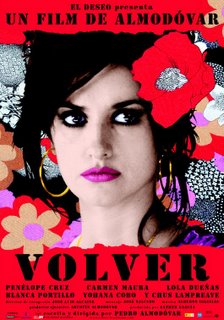 15) Volver In other, less-deft hands, Volver could have come off as a trifle. After all, the story is almost daringly slight and beside-the-point, and yet the film still managed to entrance me. It's crucial that Almodóvar has matured into a stylistic master, making every frame a study in color and composition and swathing this film in more red than anyone since Kiewslowski. The director's deep adoration of Penelope Cruz helps too, bringing out by far her best performance to date in a movie that offers up many worthwhile returns.  14) The Queen Unlike so many other films this year, The Queen is a movie about ideas coming into direct opposition. In this case, it's Queen Elizabeth's traditionalism versus Tony Blair's populist reformism in the wake of Princess Diana's death, but more generally, it's about how much the old world has to cede to the new. Is it still possible to live a public life without media training and public relations? How much access do we expect to our leaders and how much do we deserve? Peter Morgan's sophisticated screenplay suggests that, right or wrong, Blair was more in tune with the tenor of the British people in 1997. However, as the Queen forebodingly warns Blair, people also have a tendency to turn on their leaders. 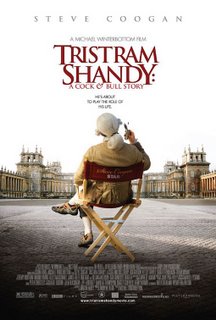 13) Tristram Shandy: A Cock and Bull Story A sort of British Adapation, Tristram Shandy thrives on its embrace of meta. It's at least as much about celebrity and filmmaking as that three-centuries-old book, but aren't films the new novel and movie stars the new literary protagonists anyway, it posits with a cheeky smirk? Diving headfirst into his role, Steve Coogan continues his quintessentially British streak of being hilarious and director Michael Winterbottom furthers his commitment to fearless filmmaking. I'm not sure how many more meta-adapations I need to see after this, but with its neurotic, endearing take on another unfilmmable book, Tristram Shandy is a worthy peek behind the scenes behind the scenes. 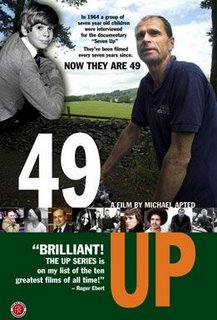 12) 49 Up If I were considering The Up Series collectively, it would no doubt be my film of the year. When viewing them as individual entities, I can't help but miss the ways they build on and off of each other, like repeated words in a sestina. Still, even on its own, 49 Up, the seventh installment in this four-decades-long-and-counting documentary, brims with the power of real lives being lived. It chronicles average British people moving into the later stages of middle age, going from parents to grandparents and starting to deal with the rigors of growing older. But like all the other parts of the series, it's also more universal than that. It's also about where we could go and where life might still deliver us. My earlier thoughts on The Up Series  11) Children of Men Wow, Alfonso Cuarón's vision of the future (based on P.D. James' novel) sounds terrifying... People being locked up without trials or due process, the government warning us to be in a constant state of fear and alert, a military fighting an endless battle it can't win. All right, so as with much of the best science fiction and fantasy, Children of Men is using its what-if setting (London 2027) to draw attention to the what-now of today's issues. The film is viciously critical (conflating Holocaust motifs and Abu Ghraib imagery) and pessimistic about the world's direction, while ultimately extending the tiniest slivers of hope. I guess there's also comfort to be found in the fact that no matter how horrible the situation gets, some residual beauty does live on, courtesy of Emanuelle Lubezki's incredible cinematography.  10) Borat: Cultural Learnings of America for Make Benefit Glorious Nation of Kazakhstan Yeah okay, Borat is an incisive cultural satire of post-millennial America and yeah, admittedly, there are some easy targets chosen. But what I'll mostly remember it for (aside from that endless wrestling scene) is the coffee I was trying to drink while viewing it. I was going on a few hours of sleep, so I bought a small cup of Peet's at the concession stand before heading into the theater. As the drink cooled and Sacha Baron Cohen stepped onscreen in an unwashed gray suit, I started to bring the styrofoam to my mouth. Then back down it immediately went without a sip, because I was laughing too hard. That kept happening over and over, until I got brave a few times. I ended up with a lap full of coffee.  9) Half Nelson Oh God, please please not another movie about a beneficient teacher in the ghetto who inspires the kids with a few well-placed yo's and a Coolio soundtrack. We already recently suffered Antonio Banderas taming unruly kids with the power of dance (Take The Lead) and now Hilary Swank is saving lives through the power of journals (Freedom Writers). But somehow, Half Nelson does in fact sidestep every cliché, making Ryan Gosling's middle school teacher Dan Dunne far more complicated than saintly. Even more impressively, Half Nelson is able to be political and provocative without being facile, neat or predigested. Like its central character, the movie isn't perfect but it's smarter and more challenging than anything around it. 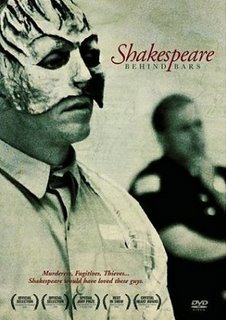 8) Shakespeare Behind Bars "I'm a warden who hates prison," Larry Chandler of Luther Luckett Correctional Complex admits about the current rehabilitation system. It's one of many statements that caught me off-guard in this extremely thoughtful documentary. Putting on a production of The Tempest, a group of inmates at Chandler's institution say a whole lot more you'd never expect to hear. With Shakespeare as the catalyst, they reflect on the nature of forgiveness and redemption, they ruminate on their crimes and contemplate the justice of their sentences, they consider what may be outside of the prison walls and the possibility of never experiencing it. But every time they try to step into the fantasy of performance, some harsher reality intrudes to add to the drama. 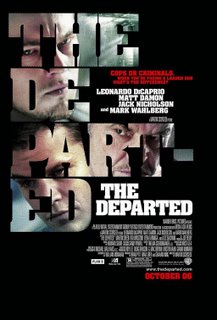 7) The Departed The odds against The Departed seemed insurmountable. It was a remake, for one, of a movie that I really liked. It also had Scorsese at the helm, who wasn't exactly at the peak of his career. And obviously with Scorsese came Leonardo DiCaprio, who, while often a pretty good actor, always feels miscast in Scorsese films. And yet somehow everything clicked. The Departed proved in most ways superior to its source, Infernal Affairs. Scorsese felt vital once again, less trapped under the weight of "importance" and Oscar bait. And DiCaprio turned in possibly his strongest and most nuanced performance yet, and certainly at least since The Basketball Diaries and What's Eating Gilbert Grape? So much for low expectations. 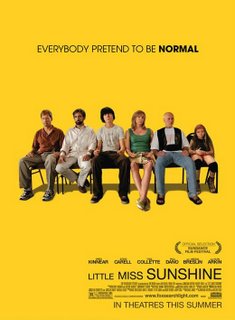 6) Little Miss Sunshine At first glance, Little Miss Sunshine may appear to be a lightweight, fish-out-of-water comedy, but take a closer look. Notice how skillful and considered the direction is and how pitch-perfect the acting is. Admire the small, endearing details (Sprite in Mayor McCheese glasses, "Go hug Mom," "Do you eat ice cream?") that give the film its heart, and the broader overtures (Olive comforting Dwayne on the roadside, Frank's Proust speech, the ending) that are somehow both touching and earned. I've heard some people complain that Little Miss Sunshine is just a dressed-up sitcom, but I'd counter it's so well-made that it only seems simple. Also, if sitcoms were really this good, I'd probably never stop watching TV.  5) The Proposition The Proposition probably owes a debt to Unforgiven, with which it shares some ideas, but suggest that to anti-hero Charlie Burns and he might blow your head off before you finish your thought. In the wilderness of late 19th century Australian settlements, guns speak louder than words and the law is still a tenuous creature. Given nine days to kill one brother to save the other, Burns is our complex guide into this untamed world. With an admirably precise script by Nick Cave (purportedly written in three weeks) and a cast that brings it to life, The Proposition is a film that, like its trigger-gripping characters, may well blow you away.  4) Pan's Labyrinth Pan's Labyrinth, like a lot of other films on my list (Children of Men, Half Nelson, The Proposition, Street Fight, hell even Borat), can be construed as a protest film. It dares you to stand up to authority and to carve out your own destiny. But of all the complaints lodged and hegemonies challenged this year, Pan's Labyrinth's presentation is easily the most poetic and the most mouth-gapingly stunning. Taking his own advice for rebellion, Guillermo del Toro has made a film that hums with his singular vision. He's made a dark fable about war and resistance, but perhaps even more importantly, he's created a cinematic portal all his own. 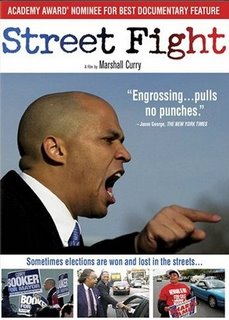 3) Street Fight Democracy, besides providing us with American Idols and blue and purple M&Ms, can also act as a barometer of a populace. In 1994, with Congress reverting to the Republicans, we got the message that the country was sick of corrupt Democrats. In 2006, with Congress reverting to the Democrats, we got the message that the country was sick of corrupt Republicans. But Newark, with its high crime and poverty rates, is a complicated city and its 2002 election between Sharpe James and Cory Booker was a complicated case. Getting into the thick of the mire, Street Fight reveals all of democracy's gruesome machinations in a riveting battle between underdog and incumbent.  2) Mutual Appreciation Mutual Appreciation comes too close. It gets too much right, with a dead-on vérité vision that's almost uncomfortable. It understands the confusions and conflicts of my early-to-mid-twenties life better than me and makes it sweet and funny to boot. It knows the remote but thrilling hopes of success; it knows the gaping ennui and romantic fumbling. With this and his first feature, Funny Ha Ha, Andrew Bujalski has made two lasting, indelibly accurate records of post-collegiate existence. And though he hates talk of influences, it's impossible not to note corollaries like John Cassavetes, Mike Leigh, Woody Allen à la Manhattan, and Jim Jarmusch à la Stranger Than Paradise, and not to marvel at what nerve-hitting work this young auteur might produce next. My interview with Andrew Bujalski  1) United 93 Like The Queen, United 93 dared to take on recent history, but it was even riskier and more raw. And yet, as nearly impossible as the movie still is to watch, nothing else felt as necessary and relevant and true. Paul Greengrass has made a movie about heroism that doesn't underline or exaggerate the heroics, a movie about sacrifice that doesn't cheapen or sentimentalize the loss, a movie about tragedy that is unflinching and unforgettable. It's an incredibly harrowing experience, but an incredible one too, a violent reminder of how precious life is and how one day can change everything. My earlier thoughts on United 93 |




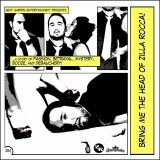
















Comments on "The best 15 films of 2006"
-
 Wayne Massingham said ... (5:28 AM) :
Wayne Massingham said ... (5:28 AM) :
-
 Wayne Massingham said ... (4:15 AM) :
Wayne Massingham said ... (4:15 AM) :
-
 Charlie said ... (1:04 PM) :
Charlie said ... (1:04 PM) :
-
 Anonymous said ... (3:16 AM) :
Anonymous said ... (3:16 AM) :
-
 Anonymous said ... (4:50 AM) :
Anonymous said ... (4:50 AM) :
post a commentTristram Shandy was great; Half Nelson hasn't been released yet in Australia-I really look forward to seeing it.
United 93 was definitely an amazing cinema experience, why isn't it nominated for best film? Just saw Pan's Labyrinth today, it blew me away, breath taking film!
You have good taste, Wayne.
It wasn't nominated because, although it's starting to get braver, the Academy is too easily taken in by bad movies pretending to be important. (Babel, Crash, A Beautiful Mind, etc.)
The say The Queen is good. I might grad a copy soon. I watch only the best movies .
I heard a lot about Pan's Labyrinth. Got it in my list of only the best movies.